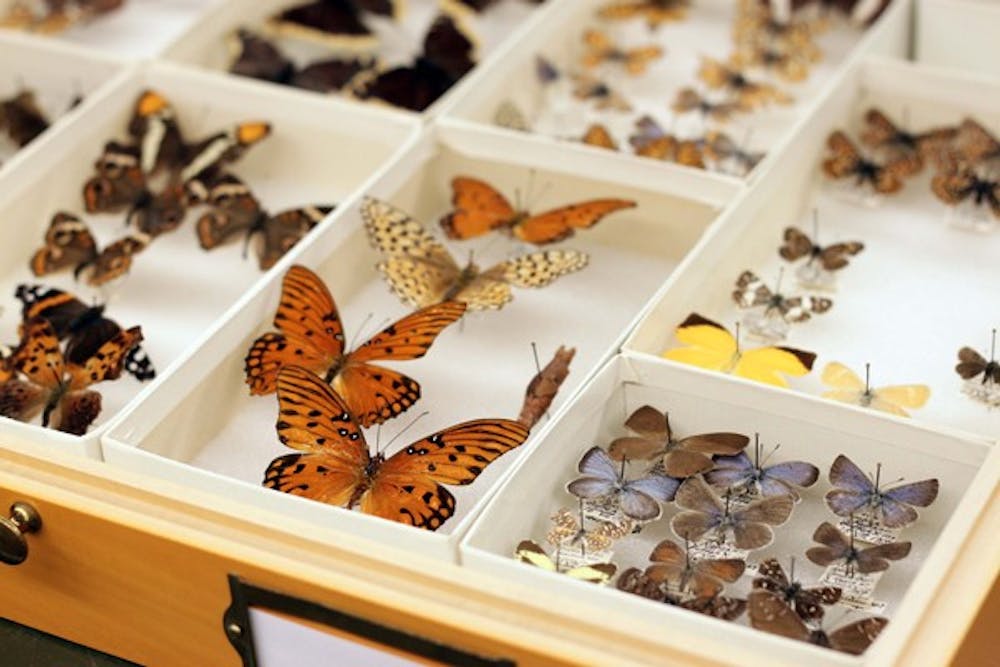The room was filled with nondescript wooden drawers full of rows and rows of preserved insects suspended with pins through their thoraxes.
The minute changes of each insect’s evolution can be observed.
Studying these small, but occasionally drastic, changes teaches scientists (and, eventually, citizens) how to care for Earth. This studying and eventual understanding is taxonomy.
David Pearson and Andrew Hamilton, professors of biology at the School of Life Sciences, and Terry Erwin of the Smithsonian National Museum of Natural History defined taxonomy in their paper “Recovery Plan for the Endangered Taxonomy Profession,” published in January 2011, as “A field of biology that identifies, describes, classifies and names living and extinct species and other taxa.”
In simplified terms, Nico Franz, curator of Frank Hasbrouck Insect Collection at ASU, said it is the field to classify the world’s species.
“Biological taxonomy is the science and practice of naming and classifying groups of organisms into a hierarchy of taxa for example, species, genera and families,” Franz said. “We do this according to their historical and evolutionary relationships.”
Biology-immersed students may recognize taxonomy and its implications, but those starting out or non-science students may not grasp the important implications classification can discover.
“Although there are exceptions, many professional taxonomists appear to be seeking goals no broader than training more professional taxonomists and convincing funding agencies to support taxonomic research,” Pearson, Hamilton and Erwin wrote in their paper.
Molecular biosciences and biotechnology junior Dustin Srinivas said the taxonomy field is waning because it is not seen as modern compared to other science fields like medicine.
“In taxonomy, there is little advancement that is left to be made and it’s not all that exciting,” Srinivas said. “Medicine will always be big because it makes the most money and there is a social motif to be attracted to being a doctor.”
The Global Taxonomy Initiative, an organization which advises governments on global taxonomic needs, said on their website taxonomy remains an important field of biology because it focuses on the numbers of existing species, allowing researchers and policy makers to know what to conserve.
At the Hasbrouck Insect Collection, Franz is responsible for an entomology collection of around 650,000 insect specimens. According to the Collections’ website, this represents approximately 25 orders, 390 families, 3,500 genera, 8,830 species and 1,240 subspecies.
Franz said he has noticed a decline in the students pursuing work in taxonomy related fields as it has not “made a case for itself that is as strong and unified as could be.”
“The toughest bottleneck seems to be the relative lack of new faculty positions and hires at top tier private and public research universities,” Franz said. “We are entering the age of comparative genomics and researchers wish to make sense of vast arrays of molecular data in comparative framework.”
Erwin, the only non-ASU author, through his work for the Smithsonian Museum of Natural History is an entomologist and curator of coleopteran, an order of beetles.
He said continued research in conservation and ecology spurred by taxonomy is needed to save our planet.
“A collapse of nature is something that humans cannot afford because that will be the collapse of our species as well,” Erwin said.
Erwin said he encouraged students to pursue careers in taxonomy, conservation and ecology.
“If you like the outdoors, taxonomy is a great excuse to live much of your life with and in nature,” Erwin said.
Reach the reporter at april.fischer@asu.edu
Click here to subscribe to the daily State Press newsletter.





